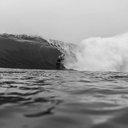FYI - DR Karl Question on JJJ regarding morning sickness


'Dr Craig', the other thing to note is that short period wind-swell/chop dissipates quite quickly compared with longer period groundswell (10 secs+), especially if there is an overnight offshore wind. I think Ben Matson's general rule is around 6 hours of 5-10kt+ offshore winds to smooth out chop (swell period below 6-7 secs) overnight.
The Mornington Peninsula in Victoria has no real downslope breeze each morning (with unfavourable topography), so is often plagued by bumpy conditions. Sydney and other east coast locations benefit from a downslope breeze off the Blue Mountains/Dividing Range, so often fare better when there is a light synoptic scale wind (especially in winter when nights are longer).
Anyway, just thought I'd add that in. The other forecast for the weekend is that the Crows are going to see their final chances slip with a loss to the Saints. Go Dons.


Some one asked on Triple J this morning..
why do you think early the ocean surface can be rough, even with no wind (morning sickness), but as the morning goes on it glasses off?
The answer to this lies in the difference between air and land temperature.
Hot air rises and that's why coastal locations see sea breezes developing during the day (more so in the summer months) because the solar radiation from the sun heats up the land warmer than the adjacent ocean resulting in an uplift in air over the land, which is replaced by the cooler air from over the ocean.
Now we also know that air temperatures over land hit a minimum during the early morning (around dawn -before the sun rises again) and this generally is lower the the adjacent ocean. Therefore the opposite to a sea breeze occurs (called a land breeze) where the wind blows light offshore towards the ocean to balance the difference in pressure gradients.
Because this land breeze only starts to develop during the early morning, you are likely to still see the effects of the overnight onshore winds on the ocean surface in the form of lumpiness, i.e. morning sickness.
Now as the morning continues and the offshore winds persist, the sea becomes cleaner until the land heats up too much and the sea breeze starts to develop again. There's likely to be a short period of glassy conditions just before the sea breeze kicks in again and this is when you get the cleanest waves.
Some locations see the local topography (mountains/ridges etc.) amplify the effects of the land breeze during the morning, and also some desert locations only see a brief period of offshore winds, if any at all before the sea breeze kicks in during the mid morning with strength.
Hope this helps anyone interested in the question.